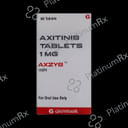Axitinib
Uses
Axitinib is used in the treatment of kidney cancer.
How it Works
How Axitinib works Axitinib is an anti-cancer medication that functions by inhibiting the action of the abnormal protein responsible for signaling cancer cells to multiply. This mechanism helps to stop or slow the spread of cancer cells.
Side Effects
Common side effects of Axitinib include fatigue, high blood pressure, dizziness, nausea, dry skin, vomiting, constipation, decreased appetite, muscle pain, anemia (low number of red blood cells), headache, weight loss, weakness, nosebleeds, ringing in the ears, diarrhea, voice changes, palmar-plantar erythrodysesthesia syndrome, increased creatinine levels in the blood, low bicarbonate levels in the blood, increased lipase levels in the blood, elevated serum amylase levels, decreased calcium levels in the blood, upper abdominal pain, dehydration, hemorrhoids, blood in urine, pulmonary embolism, and rectal bleeding.
Expert Advice
- Take it with or without food, preferably at the same time each day.
- Diarrhea may occur as a side effect; drink plenty of fluids.
- Inform your doctor if diarrhea does not stop or if you notice blood in your stools.
- Use a reliable contraceptive method to prevent pregnancy while taking this medicine and for one month after discontinuation.
- Monitor your blood pressure regularly while on this medication.
- Inform your doctor if you experience symptoms of very high blood pressure, such as:
- Severe headache
- Confusion
- Problems with your eyesight
- Nausea or vomiting
- This medication may cause serious bleeding problems; inform your doctor if you experience:
- Headaches
- Stomach pain
- Blood in your urine or stools
- Do not take this medicine if you are pregnant, planning to conceive, or breastfeeding.
Related Medications
Axitinib 5mg

₹2,070

₹1,316.5
MRP ₹2,057
Axitinib 5mg

₹3,735

₹1,316.5
MRP ₹2,057
Axitinib 5mg

₹2,304

₹1,316.5
MRP ₹2,057
Axitinib 5mg

₹41,737

₹1,316.5
MRP ₹2,057
Axitinib 5mg

₹2,380

₹1,316.5
MRP ₹2,057
Axitinib 5mg

₹1,995

₹1,316.5
MRP ₹2,057
Axitinib 5mg

₹1,499.8

₹1,316.5
MRP ₹2,057
Axitinib 5mg

₹2,699

₹1,316.5
MRP ₹2,057
Axitinib 5mg

₹6,105

₹1,316.5
MRP ₹2,057
Axitinib 5mg

₹6,250

₹1,316.5
MRP ₹2,057
Axitinib 5mg

₹4,200

₹1,316.5
MRP ₹2,057
Axitinib 5mg

₹1,316.5
MRP ₹2,057
Axitinib 1mg

₹16,694

₹904.9
MRP ₹1,160.2
Axitinib 1mg

₹7,825.3

₹904.9
MRP ₹1,160.2
Axitinib 1mg

₹450

₹904.9
MRP ₹1,160.2
Axitinib 1mg

₹495

₹904.9
MRP ₹1,160.2
Axitinib 1mg

₹610

₹904.9
MRP ₹1,160.2
Axitinib 1mg

₹630

₹904.9
MRP ₹1,160.2
Axitinib 1mg

₹495

₹904.9
MRP ₹1,160.2
Axitinib 1mg

₹750

₹904.9
MRP ₹1,160.2
Axitinib 1mg

₹2,100

₹904.9
MRP ₹1,160.2
Axitinib 1mg

₹1,250

₹904.9
MRP ₹1,160.2
Axitinib 1mg

₹1,250

₹904.9
MRP ₹1,160.2
Axitinib 1mg

₹539.8

₹904.9
MRP ₹1,160.2
Axitinib 1mg

₹904.9
MRP ₹1,160.2
Flat ₹100 off on first app order | Use Code: APP100 |
Flat ₹100 off on first app order
USE CODE: APP100

Download Now